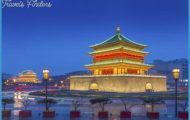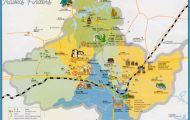Teachings stress the return to an original state, to a natural order. Preserving the equilibrium of this order is one of the purposes of life. Man is just a tiny part of the universe but he has an important part to Man and the play in the general structure of the universe which must be maintained universe as it incorporates truth. This fundamental view often moves supporters of Taoism to withdraw from public life and to lead a life of solitude according to the principles of “effortless action”. What is understood by natural order is explained by the following words of Zhuang Zi (396 286 b.c.), one of Taoism’s foremost philosophers: “The legs of the duck are short, but if we try to lengthen them the duck will suffer pain. The legs of the crane are long, but if we try to shorten them the crane will suffer pain. That is why we ought not to shorten anything that is by nature long and lengthen anything that is by nature short”.
Buddha painted on a rock near Lhasa Superstitions Taoism tried to give theoretical depth to the fundamental concepts of the old philosophy (Tao, Yin and Yang) cind all the empirical knowledge of the past (dietetics, geomancy and breathing techniques). But the re-examination of the conventional beliefs and traditions had the effect of transforming the movement into a type of religion and a doctrine based on superstitions. Almost in contradiction of Taoist philosophy (taojia), the religion (taojiao) gained ground among the people as it promised eternal salvation and immortality of the soul, just like Buddhism from where it had adopted the notion of heaven and rituals. Both such concepts were alien to the original teachings of Laotse (see Famous People) and Zhuang Zi.
Buddhism Buddhism, the last of the great religions to reach China, arrived from India along the Silk Road and took root in the 1st c. a.d. under the Han Dynasty. As the Chinese were scarcely familiar with Indian culture, and the Sanskrit and Chinese languages had very little in common, Buddhism was originally falsely regarded as a form of Taoism. Although both religions started from the premise that life is a heavy load to bear when there is so much suffering and corruption in the world, the routes that the individual could follow to redemption were quite different.
Beliefs While Taoists advocated a natural order, Buddhist monks preached salvation of the soul, but such an outcome was only achievable by renouncing all desire and earthly pleasures, thereby obtaining release from life and suffering – nirvana, a term which means eternal serenity or complete annihilation.
Unlike Taoism which regards itself as a doctrine for the individual with the hermit as its chosen symbolic figure, Buddhism possesses an organisational structure, an order of monks who withdraw into the monastery as novitiates, perform missionary work and lead a life of strict devotion.






















